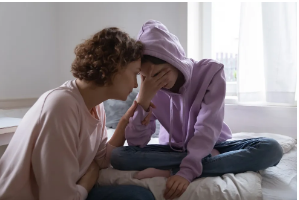Spoiled Daughter Refuses to Help Her Exhausted Single Mom, Soon Learns a Cautionary Lesson

Being a single parent with two children is difficult. Although my ex-husband supported us financially, he did not provide for us completely. I had to overcome the difficulties of raising a teenage daughter and a younger son. The burden of responsibility fell heavily on my shoulders, and I found myself juggling between work, parenting, and household chores. My daughter, at fifteen, seemed to be testing the limits of her newfound independence. She flatly refused to contribute to the household chores — no cleaning, no cooking, and little interest in helping with her brother.
Being a single parent with two children is difficult. Although my ex-husband supported us financially, he did not provide for us completely. I had to overcome the difficulties of raising a teenage daughter and a younger son. The burden of responsibility fell heavily on my shoulders, and I found myself juggling between work, parenting, and household chores. My daughter, at fifteen, seemed to be testing the limits of her newfound independence. She flatly refused to contribute to the household chores — no cleaning, no cooking, and little interest in helping with her brother.

Feeling the weight of my responsibilities increasing each day, I decided it was time for a lesson in responsibility for my daughter. I sat her down and explained that being part of a family meant sharing the load, especially in difficult times. I conveyed to her that if she refused to help, she would need to pay for living, like rent. It was a bold move, a gamble to make her realize the importance of her role within the family.
The next day my daughter walked in with a smug expression, accompanied by none other than her father, Carl. “How dare you, she’s a child,” he said rudely. I detected a smirk on my daughter’s face, and I realized my plan had worked. She believed this was a confrontation between her parents, unaware that it was a strategic move to teach her a valuable lesson.

Anticipating her complaint to her father, I had taken the initiative to call Carl beforehand, laying out the entire situation and my plan. I asked him to play along, and surprisingly, he agreed. It was a relief to find common ground with him, at least when it came to the well-being and upbringing of our children. As he berated me for my supposed mistreatment of our daughter, I engaged in a heated argument until I suddenly pretended to pass out.

I didn’t witness my daughter’s immediate reaction, but according to Carl, she flinched and wore a look of genuine fright on her face. Following our staged scene, Carl dropped a bombshell on our daughter. He announced that he would be taking both her and her younger brother to live with him. However, there was a catch — she would have to take on the responsibilities she had been avoiding at my place. The shock on her face was palpable, and in a surprising turn of events, she threw herself on top of me, hugging me tightly.
After the theatrics subsided, the three of us sat down to have an open and honest conversation. Carl and I took turns explaining the importance of her active participation in maintaining the household. We avoided berating or pressuring her but engaged in a mature discussion about responsibilities and shared duties. To my relief, the conversation worked. Our daughter not only understood the gravity of her actions but sincerely apologized for her behavior.

In the days that followed, a remarkable transformation unfolded. My daughter began actively participating in household chores, willingly taking on responsibilities without any resentment. She started offering her help in various aspects of our daily lives, and I couldn’t have been happier with the positive change.

Girl wash the dishes. While my plan had been a risky gamble, I was grateful that my ex-husband supported me in delivering a lesson that ultimately strengthened our family bonds. It was a testament to the power of communication, understanding, and shared parenting values. In the end, the experience brought about a positive change in our family dynamics, proving that sometimes unconventional methods can lead to the most profound lessons.




